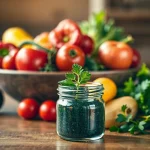Essential British Herbs for Traditional Cooking
British herbs play a vital role in traditional British cuisine, adding depth and authenticity to beloved dishes. Among the most common British herbs are parsley, thyme, mint, rosemary, sage, and chives. Each herb carries a unique flavor that has shaped classic recipes for centuries.
Parsley offers a fresh, slightly peppery taste often used to garnish or brighten dishes. Thyme’s earthy, slightly minty notes complement meats and stews, while rosemary brings a robust pine-like aroma, essential for roast lamb. Mint is famously paired with lamb to create a refreshing contrast, and sage’s warm, slightly peppery flavor enriches stuffing and sausages. Chives provide a mild oniony zest, perfect for potatoes and egg dishes.
Also read : What are the Benefits of British Cooking on Health?
Historically, these herbs were prized not only for flavor but also for medicinal qualities in British households. Fresh herbs typically deliver the most vibrant flavors in cooking, but dried herbs also have a place, especially when fresh options are unavailable. Understanding the distinct profiles and uses of these common British herbs lets home cooks recreate truly authentic British meals with confidence and ease.
Essential British Herbs for Traditional Cooking
Discover the heart of British flavor through its iconic herbs.
In parallel : How Can Traditional British Dishes Be Updated for Modern Tastes?
British herbs form the cornerstone of traditional British cuisine, with varieties like parsley, thyme, mint, rosemary, sage, and chives leading the way. Each herb carries historical significance, having been cultivated and used in British kitchens for centuries, contributing uniquely to authentic flavor profiles. For instance, rosemary’s piney aroma brightens roast lamb, while sage’s earthy notes enrich stuffing and meats.
The difference between fresh vs. dried herbs significantly impacts British cooking. Fresh herbs offer vibrant, delicate flavors and are usually added near the dish’s end to retain their aroma. Dried herbs, being more concentrated, suit slow-cooked recipes, infusing richness over time. Parsley’s fresh, clean taste and thyme’s woody undertones exemplify how British chefs balance these options.
Knowing the role of these common British herbs allows home cooks to embrace tradition with confidence, crafting classic flavors that define British fare. Employing fresh or dried herbs thoughtfully elevates every meal while honoring the roots of British gastronomy.
Practical Methods for Using British Herbs in the Kitchen
Mastering the art of using British herbs elevates traditional British cuisine by unlocking their full flavor potential. When chopping common British herbs like parsley, thyme, and rosemary, use a sharp knife and aim for uniform pieces to release essential oils evenly. For softer herbs such as mint and chives, gentle chopping preserves their delicate texture and aroma.
Infusing herbs into dishes is a classic technique. Add hardy herbs like rosemary and thyme early in the cooking process to infuse flavors into soups, stews, or roasts. Softer herbs including parsley and mint are best added near the end to retain their fresh, bright taste.
To maintain the quality of both fresh and dried herbs, proper storage is vital. Fresh British herbs should be wrapped loosely in damp paper towels and refrigerated, extending freshness for several days. Dried herbs, while less vibrant, remain useful when stored in airtight containers away from heat and moisture.
By understanding these cooking techniques and storage practices, home cooks can maximize the aromatic and flavorful impact of British herbs across a variety of traditional dishes.
Practical Methods for Using British Herbs in the Kitchen
Discover techniques to maximize flavor and freshness.
When using British herbs like parsley, thyme, and rosemary, proper preparation is key to unlocking their full potential. Chopping herbs finely releases essential oils, enhancing aroma and taste. For delicate herbs such as chives and mint, a gentle chiffonade technique preserves their texture and freshness. Infusing herbs in oils or stocks allows deeper flavors to permeate dishes, especially useful in stews and roasts traditional to British cuisine.
Timing is crucial when adding herbs during cooking. Dried herbs, common in British kitchens, excel when added early to release flavor gradually, while fresh British herbs are best stirred in at the end to maintain their bright notes. For example, fresh parsley often tops finished dishes, whereas dried thyme can simmer to tenderize meats.
Proper storage preserves herb freshness and potency. Wrap fresh herbs in damp paper towels and store in the fridge to extend shelf life. Dried herbs should be kept airtight, away from heat and light. By mastering chopping, infusing, timing, and storage, cooks enhance authentic British flavors while making the most of these versatile ingredients.
Essential British Herbs for Traditional Cooking
A closer look at the classics that define British culinary heritage.
British herbs such as parsley, thyme, mint, rosemary, sage, and chives form the backbone of traditional British cuisine. Parsley’s bright, slightly peppery tone lifts soups and sauces, while thyme adds a woody, slightly minty complexity essential in stews and roasts. Rosemary, with its distinct pine aroma, is a classic match for roast lamb, contributing robust flavor depth. Mint introduces a fresh, cooling contrast, famously paired with lamb dishes to balance richness. Sage, earthy and peppery, enriches stuffing and sausages, and chives bring a gentle onion-like zest, perfect for potatoes and eggs.
Historically, these common British herbs weren’t just culinary helpers—they had medicinal values and were staples in British households. Today, fresh herbs remain prized for their vibrant aroma and delicate flavor, often added late during cooking to preserve their notes. Dried herbs, concentrated yet milder, are favored for slow-cooked recipes, imparting sustained aroma without overpowering the dish.
The thoughtful use of fresh and dried British herbs ensures authentic, traditional flavors resonate in every meal.
Classic British Dishes Enhanced with Herbs
Discover how herbs elevate traditional British flavors.
British recipes often rely on common British herbs to create unmistakable tastes. For example, roast lamb with rosemary is a signature dish where rosemary’s aromatic pine essence complements the rich meat perfectly. Similarly, mint sauce, a classic pairing for lamb, offers a refreshing contrast that brightens each bite.
Herbs also play crucial roles in traditional sides. Sage is a cornerstone in stuffing recipes, imparting a warm, earthy note that ties together savory elements. Chives enhance potato dishes with a subtle onion flavor, and parsley sauce is a beloved accompaniment for fish, infusing freshness.
Quick meals and snacks benefit too from herb enhancement. Adding chives to scrambled eggs or sprinkling thyme on roasted vegetables instantly elevates simple plates. These uses show how British herbs not only define main meals but also refine everyday cooking.
Incorporating these herbs into British food lets cooks capture the essence of traditional dishes, ensuring authentic flavor profiles through familiar additions. Exploring herb-infused recipes offers an easy, flavorful way to experience British culinary heritage.
Essential British Herbs for Traditional Cooking
Discover the heart of British flavor through its classic herbs.
British herbs such as parsley, thyme, mint, rosemary, sage, and chives are foundational to traditional British cuisine. Parsley, with its fresh, slightly peppery taste, brightens sauces and stews. Thyme adds a subtle earthiness and slight minty undertones, ideal for slow-cooked dishes. Rosemary’s distinct pine aroma pairs famously with roast lamb, providing robust flavor depth. Mint brings a refreshing contrast that balances richer meats, particularly lamb. Sage contributes warm, peppery notes, often enhancing stuffing and sausages. Chives offer a mild onion flavor, perfect for potatoes and egg dishes.
Historically, these common British herbs were valued not only for flavor but also for medicinal properties, cultivated in home gardens and kitchens alike. Today, understanding their authentic flavor profiles helps preserve tradition. The availability of fresh versus dried herbs affects their use: fresh herbs deliver brighter, delicate flavors when added late in cooking, while dried herbs—more concentrated—are ideal for long, slow preparations, infusing subtle depth over time. Mastery of these herbs ensures dishes retain the distinctive character of British gastronomy.
Essential British Herbs for Traditional Cooking
A foundational look at herbs shaping British culinary heritage.
British herbs such as parsley, thyme, mint, rosemary, sage, and chives are indispensable in traditional British cuisine. These common British herbs offer a variety of unique flavor profiles: parsley lends a fresh, slightly peppery brightness; thyme provides earthy, woody undertones; mint contributes a cool freshness; rosemary gives a strong pine aroma; sage imparts warm, peppery notes; and chives offer a mild onion zest. Understanding these herbs’ characteristics is key to recreating authentic dishes.
Historically, these herbs were cultivated not only for culinary use but also for medicinal purposes, embedding them deeply into British food culture.
Both fresh and dried forms are widely used in British cooking. Fresh herbs deliver vibrant, delicate flavors ideal for garnishing or finishing dishes. Dried herbs, being more concentrated, are preferred in slow-cooked recipes to infuse subtle, sustained aromas over time. Knowing when and how to use both forms enhances the genuine taste of classic British recipes, making these herbs essential staples in every kitchen.
Essential British Herbs for Traditional Cooking
Discover the heart of British flavor through its classic herbs.
British herbs such as parsley, thyme, mint, rosemary, sage, and chives are central to traditional British cuisine, each contributing unique and authentic flavor profiles. Parsley provides a fresh, slightly peppery brightness often used to finish dishes. Thyme imparts subtle earthiness with mild minty undertones, ideal in stews and roasts. Rosemary’s strong pine aroma complements lamb, a classic pairing in British recipes. Mint offers a refreshing contrast, especially paired with lamb, while sage lends warm, peppery depth to sausages and stuffing. Chives add a gentle oniony note, perfect for potatoes and eggs.
Historically, these common British herbs were cultivated not only for flavor but also medicinal uses, reflecting their importance in British households. The choice between fresh and dried herbs affects traditional cooking techniques. Fresh herbs deliver vibrant, delicate flavors best added near the end of cooking, while dried British herbs are more concentrated, ideal for slow-cooking where flavors can infuse gradually. Mastering the use of these herbs ensures dishes maintain the genuine character of authentic British fare.
Essential British Herbs for Traditional Cooking
A foundational look at the herbs shaping British culinary heritage.
British herbs such as parsley, thyme, mint, rosemary, sage, and chives are central to traditional British cuisine. Parsley offers a fresh, slightly peppery brightness that lightens rich sauces and soups. Thyme contributes an earthy, woody complexity essential to hearty stews and roasts. Mint brings a cool, refreshing note, famously paired with lamb. Rosemary adds a robust pine aroma, enhancing roasted meats’ depth. Sage’s warm, peppery flavor is indispensable in stuffing and sausages. Chives provide a mild onion zest, perfect for seasoning potatoes and egg dishes.
Historically, these common British herbs had culinary and medicinal roles, often grown in home gardens. Their authentic flavor profiles carry centuries of tradition in British cooking.
Fresh versus dried herbs have distinct uses. Fresh herbs deliver vibrant, delicate flavors, best added late to preserve aroma. Dried herbs, being more concentrated, excel in slow-cooked dishes, infusing subtle, sustained depth. Mastering the use of fresh and dried British herbs elevates traditional dishes and maintains genuine British flavors.






